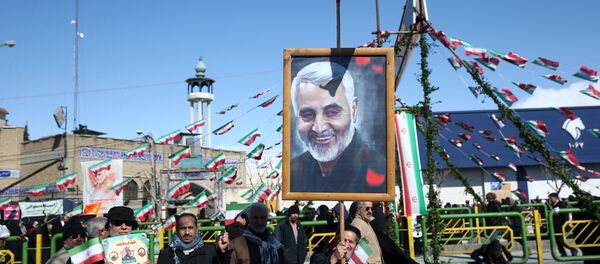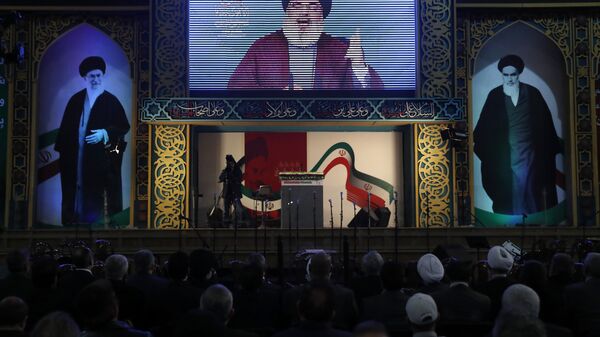Despite the reassurances of Israeli experts that the Jewish state has nothing to fear following Washington's strike that assassinated one of Iran's top commanders, Qasem Soleimani, in early January, it seems that the Jewish state has every reason to worry.
Empty promises?
First it was the huge statue of the slain commander that was erected on the Lebanon-Israel border, warning the Jewish state that revenge was still an option, and then it was the comments made by the head of Israel's northern command, Gen. Amir Baram, who said that Hezbollah, a Shiite militia thought to be linked to Iran, "is persisting with its efforts to procure and arm itself with precision weapons" that would be used against Israel.
The US is also on Hezbollah's radar: a week ago, during his speech commemorating the 40th day since the assassination of Soleimani, the group's chief Hassan Nasrallah threatened to use a "new" weapon against the US, boycotting American goods and the dollar, although a military option was still on the table.
They won't dare
But Prof. Eyal Zisser, one of Israel's leading Middle East experts and the Vice Rector of Tel Aviv University, believes that Israel and the US should not worry more than Hezbollah itself.
"President Donald Trump is not afraid of anything and Nasrallah knows that he might face Soleimani's destiny if he continues to stretch the rope."
At the same time, these threats should not be taken lightly, believes Zisser. "Unlike Daesh that has individual supporters scattered around the world, Hezbollah is not a gang, it is a semi-army. It is well-trained and organised."
The capabilities are there
According to the estimates of the Israeli media, the organisation boasts an army of 50,000, and possesses an arsenal of up to 150,000 rockets, more than the combined missile arsenal of the NATO states, with the exception of the US.
Hundreds of these are long-range, and they also have an array of remotely-controlled aircraft, as well as shore-to-ship, anti-tank and anti-aircraft missiles, and a network of sophisticated tunnels that make the group one of the strongest militias in the region.
But apart from having capabilities inside Lebanon, studies show that the Shiite organisation also possesses a network of cells scattered around the globe. While their presence in Syria, Iraq, Nigeria and Kenya has been known for years, outside the Middle East and Africa their activity hasn't been in the spotlight.

Then Latin American countries have been watching the group's activity closely and have played a pivotal role in exposing Hezbollah's involvement in arms and drug smuggling in such countries as Argentina and Paraguay, which eventually designated the Iran-linked militia group as a terrorist organisation.
Europe has also seen a surge in Hezbollah activity following a deadly attack on Bulgaria's Burgas Airport in July 2012, when a Lebanese national linked to the group set off a bomb, killing five Israeli tourists and a Bulgarian bus driver.
In Germany, for example, there are approximately 1,500 Hezbollah operatives with reports suggesting that they are also active in such countries as France, the UK, the Czech Republic, Italy, Belgium and Cyprus.
East Asia hasn't been immune to the group's threats either. In January 2012, Thai police arrested a suspected Hezbollah operative at the Bangkok airport. Elsewhere in the capital, authorities seized a large cache of chemical explosives, leading investigators to believe that the Shiite militia was planning an attack.
Other Asian states have also witnessed similar activities, including Singapore, the Philippines, Malaysia, Burma and India, where in 2012 Iranians attached a sticky bomb to the car door of an Israeli diplomat, wounding a number of people.
Not in anyone's pocket
"Theoretically, because Hezbollah and Iran are such close allies, the Shiite group might want to help the Islamic Republic carry out attacks against the US. At the same time, Hezbollah has its own will and is not entirely in the pocket of Iran, so it might want to think twice before engaging in an open conflict with Washington."
Apart from "the unpredictability of the US president", says Zisser, Hezbollah, which constitutes an integral part of the Lebanese government, is mired in economic and political instability following the eruption of mostly non-violent protests that demanded the implementation of a series of economic reforms and eventually led to the resignation of Lebanese prime minister Saad Hariri.
"The potential is certainly there as Hezbollah has the support, the organisation and the training needed to carry out attacks, but I very much doubt they will back Iran openly or engage themselves in a direct conflict with Washington, preferring to assist with logistics and the provision of information."

